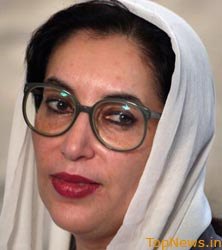‘Benazir’s assassination can destabilise Pakistan’
 Washington, Jan 4: The assassination of former Prime Minister Benazir Bhutto has created conditions which can contribute to the ongoing destabilisation and fragmentation of Pakistan, claims Professor Michel Chossudovsky of the Centre for Global Research, California.
Washington, Jan 4: The assassination of former Prime Minister Benazir Bhutto has created conditions which can contribute to the ongoing destabilisation and fragmentation of Pakistan, claims Professor Michel Chossudovsky of the Centre for Global Research, California.
Chossudovsky argues that the process of US sponsored "regime change", which normally consists in the re-formation of a fresh proxy government under new leaders, has been broken.
Discredited in the eyes of Pakistani public, President Pervez Musharraf cannot remain in the seat of political power, he writes in an analytical piece.
"But at the same time, the fake elections supported by the "international community", even if they were to be carried out, would not be accepted as legitimate, thereby creating a political impasse. There are indications that US officials anticipated Benazir’s assassination," he stated.
Chossudovsky believes that it has been known "for months" that the Bush Administration and its allies have been manoeuvring to strengthen their political control of Pakistan, paving the way for the expansion and deepening of the "war on terrorism" across the region.
He said that various American destabilisation plans, known for months by officials and analysts, proposed the toppling of Pakistan’s military, and added that the assassination of Benazir appears to have been anticipated.
There were even reports of ‘chatter’ among US officials about the possible assassinations of either Musharraf or Benazir, well before the actual attempts took place, he writes.
"Regime change" with a view to ensuring continuity under military rule is no longer the main thrust of US foreign policy. The regime of Pervez Musharraf cannot prevail. Washington’s foreign policy course is to actively promote the political fragmentation and balkanisation of Pakistan as a nation, he fears.
Chossudovsky writes that a new political leadership is anticipated, but in all likelihood it will take on a very different shape, in relation to previous US sponsored regimes.
One can expect that Washington will push for a compliant political leadership, with no commitment to the national interest, a leadership that will serve US imperial interests, he adds.
"The political impasse is deliberate. It is part of an evolving US foreign policy agenda, which favours disruption and disarray in the structures of the Pakistani State," the Daily Times quoted Chossudovsky, as saying.
Indirect rule by the Pakistani military and intelligence apparatus is to be replaced by more direct forms of US interference, including an expanded US military presence inside Pakistan, he predicts. (ANI)